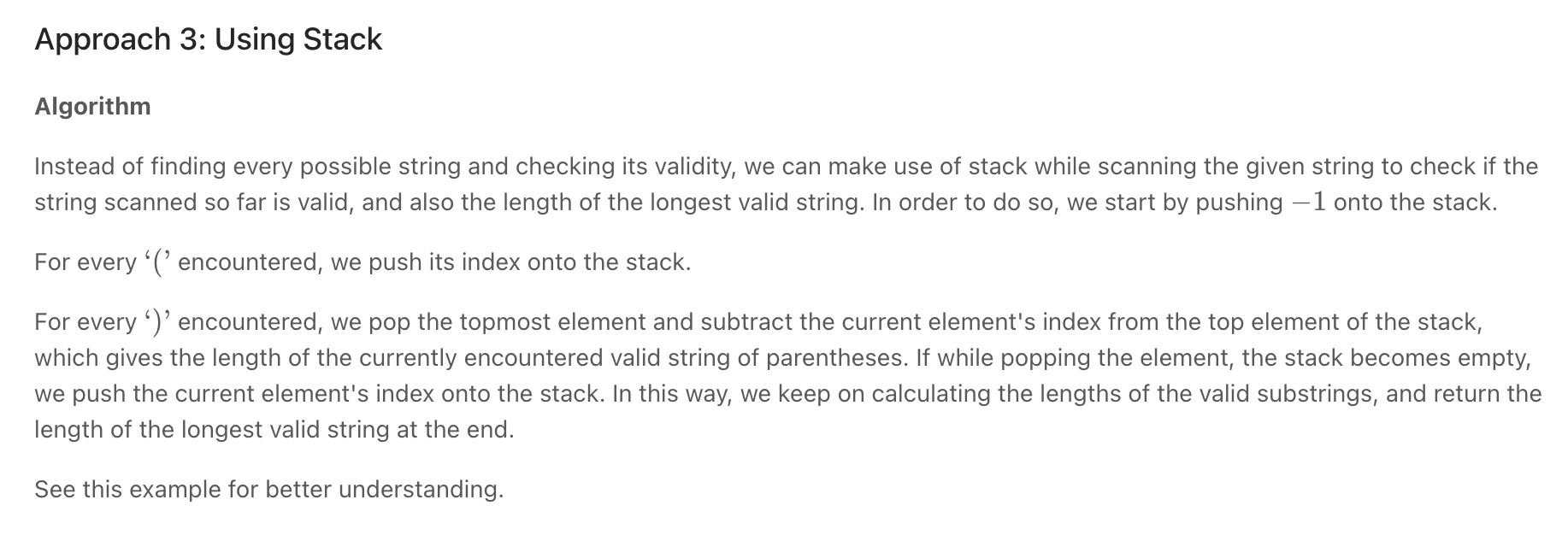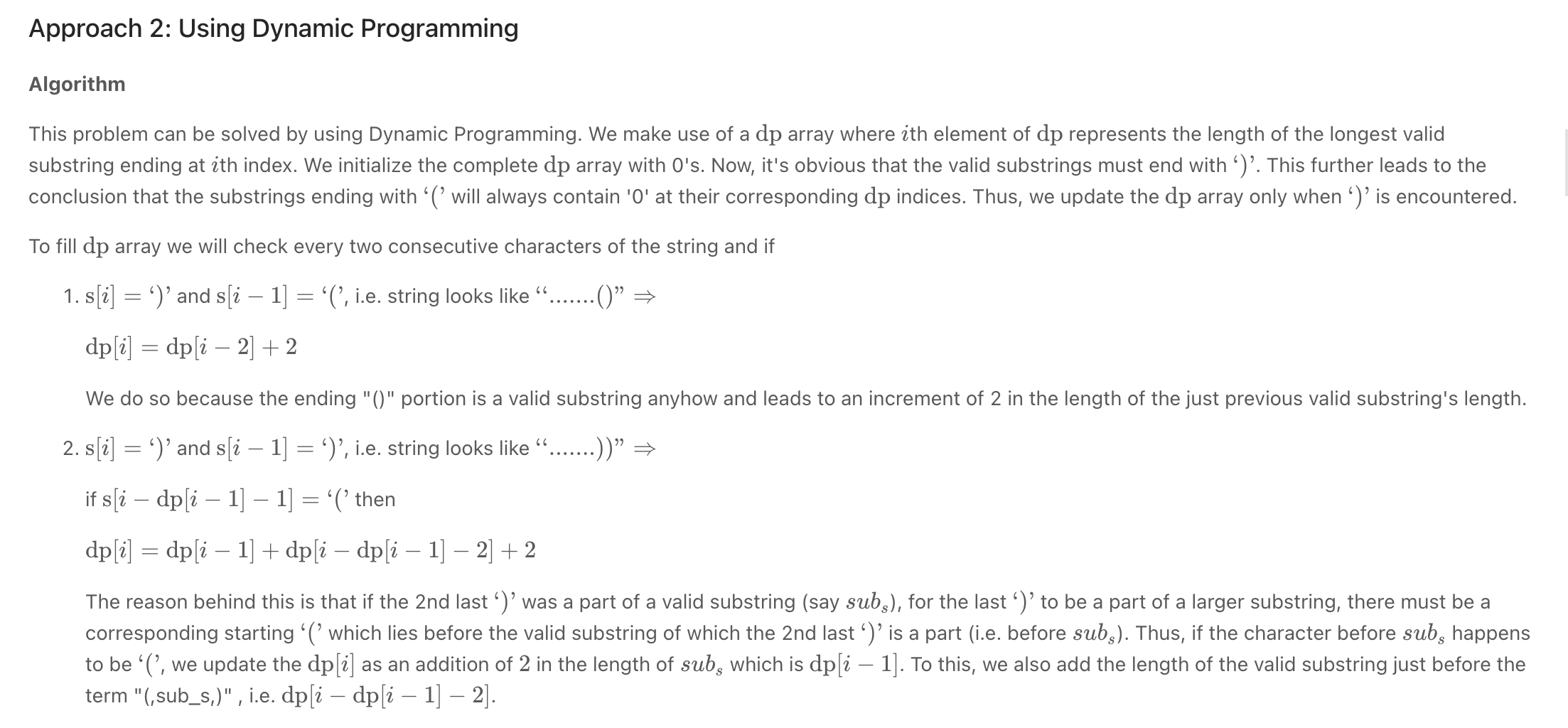Parenthesis
-
Valid Parentheses / Balanced Brackets
""" Valid Parentheses / Balanced Brackets Given a string s containing just the characters '(', ')', '{', '}', '[' and ']', determine if the input string is valid. An input string is valid if: Open brackets must be closed by the same type of brackets. Open brackets must be closed in the correct order. https://leetcode.com/problems/valid-parentheses/ https://www.algoexpert.io/questions/Balanced%20Brackets """ class Solution(object): def isValid(self, s): myStack = [] match = { "(": ")", "[": "]", "{": "}" } for par in s: if par == "(" or par == "{" or par == "[": myStack.append(par) elif len(myStack) == 0 or match[myStack.pop()] != par: return False return len(myStack) == 0 def balancedBrackets(string): opening_brackets = "([{" matching_brackets = {")": "(", "]": "[", "}": "{"} stack = [] for char in string: if char not in matching_brackets and char in opening_brackets: # opening bracket stack.append(char) # closing brackets elif char in matching_brackets and(not stack or matching_brackets[char] != stack.pop(-1)): return False return len(stack) == 0 print(balancedBrackets("([])(){}(())()()")) print(balancedBrackets("([])(){}(()))()()")) -
Minimum Add to Make Parentheses Valid
""" 921. Minimum Add to Make Parentheses Valid A parentheses string is valid if and only if: It is the empty string, It can be written as AB (A concatenated with B), where A and B are valid strings, or It can be written as (A), where A is a valid string. You are given a parentheses string s. In one move, you can insert a parenthesis at any position of the string. For example, if s = "()))", you can insert an opening parenthesis to be "(()))" or a closing parenthesis to be "())))". Return the minimum number of moves required to make s valid. Example 1: Input: s = "())" Output: 1 Example 2: Input: s = "(((" Output: 3 Example 3: Input: s = "()" Output: 0 Example 4: Input: s = "()))((" Output: 4 https://leetcode.com/problems/minimum-add-to-make-parentheses-valid """ class Solution: def minAddToMakeValid(self, s: str): invalid_closing = 0 invalid_opening = 0 # invalid closing opening_remaining = 0 for char in s: if char == "(": opening_remaining += 1 else: if opening_remaining > 0: opening_remaining -= 1 else: invalid_closing += 1 # invalid closing closing_remaining = 0 for idx in reversed(range(len(s))): if s[idx] == ")": closing_remaining += 1 else: if closing_remaining > 0: closing_remaining -= 1 else: invalid_opening += 1 return invalid_opening + invalid_closing -
Longest Valid Parentheses **

Screen Recording 2021-10-17 at 11.27.12.mov

Screen Recording 2021-11-03 at 18.23.28.mov
""" Longest Valid Parentheses: Given a string containing just the characters '(' and ')', find the length of the longest valid (well-formed) parentheses substring. https://leetcode.com/problems/longest-valid-parentheses/ https://paulonteri.notion.site/Parenthesis-b2a79fe0baaf47459a53183b2f99115c """ from collections import deque class Solution: def longestValidParentheses(self, s: str): """Store the longest streak we had so far at each index so that we can look back""" if not s: return 0 opening_brackets = 0 longest_so_far = [0]*(len(s)+1) for idx, char in enumerate(s): # opening brackets if char == '(': opening_brackets += 1 # closing brackets else: if opening_brackets <= 0: continue opening_brackets -= 1 length = 2 # create streak # # "()" if s[idx-1] == "(" and idx > 1: # add what is outside the brackets. Eg: (())() - at the last idx length += longest_so_far[idx-2] # #"))" elif s[idx-1] == ")": # continue streak length += longest_so_far[idx-1] # add what is outside the brackets. Eg: ()(()) - at the last idx if idx-length >= 0: length += longest_so_far[idx-length] longest_so_far[idx] = length return max(longest_so_far) """ "((())())" ['(', '(', '(', ')', ')', '(', ')', ')'] [ 0, 1, 2, 3, 4, 5, 6, 7] idx,res,c_l,stack 0 0 0 [0] 1 0 0 [0,0] 2 0 0 [0,0,0] 3 2 2 [0,0] 4 4 4 [0] 5 4 0 [4,0] 6 6 6 [0] 7 8 8 [] """ class Solution__: def longestValidParentheses(self, s: str): """ Whenever we see a new open parenthesis, reset the streak we push the current longest streak to the prev_streak_stack. and reset the current length Whenever we see a close parenthesis, extend the streak If there is no matching open parenthesis for a close parenthesis, reset the current count. else: we pop the top value, and add the value (which was the previous longest streak up to that point) to the current one (because they are now contiguous) and add 2 to count for the matching open and close parenthesis. Use this example to understand `"(()())"` """ res = 0 prev_streak_stack, curr_length = [], 0 for char in s: # # saves streak that might be continued or broken by the next closing brackets if char == '(': prev_streak_stack.append(curr_length) # save prev streak curr_length = 0 # reset streak # # create/increase or reset streak elif char == ')': if prev_streak_stack: curr_length = curr_length + prev_streak_stack.pop() + 2 res = max(res, curr_length) else: curr_length = 0 return res """ """ class Solution_: def longestValidParentheses(self, s: str): """ use stack to store left most invalid positions (followed by opening brackets) note that an unclosed opening brackets is also invalid """ result = 0 # stack contains left most invalid positions stack = deque([-1]) for idx, bracket in enumerate(s): if bracket == "(": stack.append(idx) else: stack.pop() # the top of the stack should now contain the left most invalid index if stack: result = max(result, idx-stack[-1]) # if not, the element removed was not an opening bracket but the left most invalid index # which means that this closing bracket is invalid and should be added to the top of the stack else: stack.append(idx) return result
Maximum Nesting Depth of Two Valid Parentheses Strings - LeetCode
Find the original version of this page (with additional content) on Notion here.
Last update:
December 13, 2021 16:05:48
Created: December 13, 2021 16:05:48
Created: December 13, 2021 16:05:48
Authors: